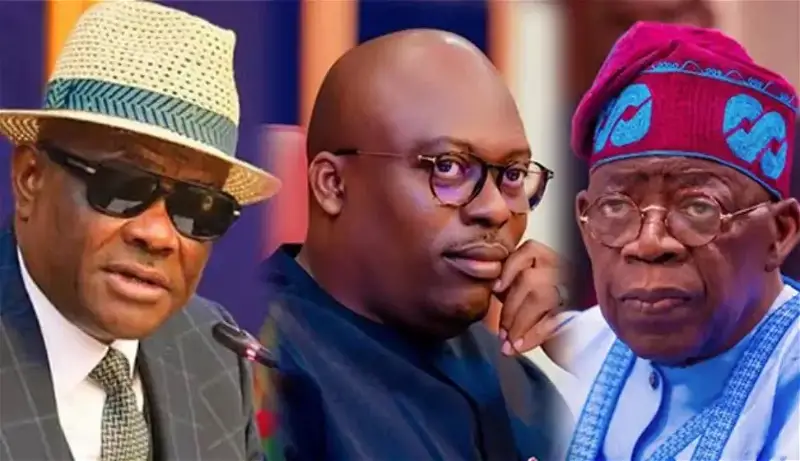The ongoing friction between Rivers State Governor Siminalayi Fubara and his predecessor, Nyesom Wike, has captured the attention of the nation, sparking conversations about loyalty, governance, and the personal dynamics that often shape political landscapes. As both men engage in what appears to be a test of political strength, the question arises: “Will Wike no longer be Wike, or Fubara no longer be Fubara if they choose to shield their swords and focus on the greater good?”
Wike, the charismatic former governor and now a prominent figure in Nigeria’s political arena, has a reputation for his assertiveness and political dexterity. Fubara, on the other hand, was once seen as Wike’s political protégé, rising to the governorship largely due to Wike’s influence. However, their relationship, which seemed rock-solid during the campaign period, has grown increasingly strained as Fubara works to establish his own identity as governor.

In Nigerian politics, it is not uncommon for successors to feel overshadowed by their predecessors, especially when the latter wields significant influence. Fubara’s attempts to assert his independence may be seen as an effort to step out of Wike’s shadow and make a mark of his own. However, for Wike, this might be perceived as ingratitude or an affront to his legacy and political prowess.
At the heart of this power tussle is the larger-than-life image of Wike, whose legacy in Rivers State remains undeniable. His achievements, particularly in infrastructure development, are visible across the state. But as Fubara begins to carve out his path, the question remains: “Can both men coexist without undermining each other?”
In many ways, the conflict between Wike and Fubara represents the age-old battle between continuity and change. Wike’s legacy, while significant, must evolve as Rivers State enters a new chapter under Fubara’s leadership. On the other hand, Fubara’s leadership needs stability and wisdom from his predecessor’s experience to fully thrive.
Should Wike and Fubara continue their standoff, the state may suffer from the distraction of political infighting. In times like these, the focus must shift from individual interests to collective governance. Rivers State, with its rich resources and potential, deserves leadership that is unified in its pursuit of progress.

Analyzing the Wike-Fubara fight from any perspective yields one clear conclusion: this conflict, in no way, represents progress for Rivers State or the individuals involved. From whichever ramification it is assessed, politically, socially, or economically, their feud only serves to stall the state’s advancement and perpetuate division among their supporters.
Their ongoing dispute is not a symbol of strength but rather a distraction from the pressing challenges that demand their attention as leaders. In a state that has the potential for industrial growth, infrastructural expansion, and improvement in the welfare of its citizens, such internal squabbles only detract from governance. If the two leaders could channel the same energy they expend on their rivalry into resolving Rivers State’s issues, they would deliver lasting change that the people of the state desperately need.
It is essential to remind both Wike and Fubara that making peace and setting aside their differences will not make them lesser human beings, nor will it diminish their political standing. On the contrary, it would elevate them as leaders who can rise above personal grudges and put their state first. History has shown that true leadership is measured by the ability to prioritize the greater good, even when it means stepping back from conflict.
Wike, with his vast political experience and influence, should recognize the long-term benefits of reconciliation. His power and reputation will remain intact if he chooses to mentor Fubara from a place of peace rather than competition. Fubara, too, has nothing to lose by seeking harmony with his predecessor. By doing so, he will not only solidify his standing as governor but also prove that he is a leader capable of forging unity, not division.
The people of Rivers State need a united leadership. The developmental challenges facing the state, from unemployment to infrastructure decay, cannot be effectively addressed if the leaders are constantly at odds. By shielding their swords, Wike and Fubara would send a powerful message that they are willing to do what it takes to put their state first.

Rivers State’s development trajectory should not be derailed by personal differences. A peaceful resolution between Wike and Fubara is not just a matter of political convenience; it is a necessity for the progress of the state. The people of Rivers deserve leaders who are focused on governance, not bickering.
Their fight does not benefit anyone, not their loyalists, not the state’s economy, and certainly not the ordinary citizens who look to them for leadership. For Rivers State to flourish, both Wike and Fubara must rise above this unnecessary conflict and work together.
History will remember them not for the battles they fought against each other, but for the legacies they left behind. If Wike and Fubara choose to shield their swords, they will not lose their identities. Rather, they will be remembered as statesmen who put their people first.
In the end, true leadership is defined by wisdom, not just power. Rivers State needs both Wike and Fubara to lead with that wisdom, not with their swords drawn. The question now is, will they rise to the occasion?


![[OPINION] Will Wike No More Be Wike, Or Fubara No More Fubara If They Shield Their Swords? - Isaac Asabor](/media/k2/items/cache/2419133c6958946df8f5766e5c238333_XL.jpg)